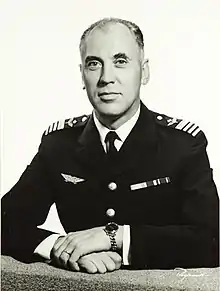Dick Stenberg
Lieutenant General Dick Stenberg (21 January 1921 – 27 September 2004) was a Swedish Air Force officer. Stenberg was commissioned as an officer in 1942 and was later the commanding officer of Södertörn Air Force Wing and Chief of the Air Staff. Stenberg ended his military career with the position of Chief of the Air Force from 1973 to 1982.
Dick Stenberg | |
|---|---|
 | |
| Born | 21 January 1921 Falun, Sweden |
| Died | 27 September 2004 (aged 83) Stockholm, Sweden |
| Buried | |
| Allegiance | Sweden |
| Service/ | Swedish Air Force |
| Years of service | 1942–1982 |
| Rank | Lieutenant General |
| Commands held | |
| Battles/wars | Congo Crisis |
Career
Stenberg was born on 21 January 1921 in Falun, Sweden, the son of Karl Edvard Stenberg, a foreman, and his wife Karin (née Olofsson). He passed studentexamen at the Higher General Grammar School for Boys in Södermalm (Södra Latin) in Stockholm on 10 May 1939. Stenberg became an officer aspirant in the Swedish Air Force on 16 June 1939 and he became an officer and fänrik there on 24 March 1942. He was a flight instructor at the Swedish Air Force Flying School (F 5) from 1942 to 1948 and he was promoted to löjtnant on 14 April 1944. Stenberg underwent flight instructor courses at the Royal Air Force Flight Academy from 1944 to 1948 and was admitted to the Royal Swedish Air Force Staff College in Stockholm in 1948 and he was promoted to kapten on 1 April 1949. He was then a fighter pilot and was squadron leader at Svea Air Force Wing (F 8) from 1949 to 1954 and became major on 1 October 1954 and was head of the Aviation Department at Södertörn Air Force Wing (F 18) in 1955.[1]
Stenberg became chief of staff of the Third Air Group (Tredje flygeskadern, E 3) on 1 May 1957 and was promoted to lieutenant colonel on 1 October 1958 and was appointed head of the Aviation and Air Defence Department at the Defence Staff on 1 April 1960. He was aviation commander of the 22 U.N. Fighter Squadron (F 22) in Congo during the Congo Crisis from November 1962 to April 1963.[1] The core of the Swedish squadron consisted of 11 Saab 29 Tunnan. Stenberg co-operated there with Sven Lampell, his former classmate from Södra Latin.[2] Back in Sweden, he was promoted to colonel and appointed commanding officer of Södertörn Air Force Wing on 1 April (took office on 1 May) 1963.[1]
Stenberg was second vice chairman of the Swedish Officers Association from 1963 to 1965, and was appointed aviation inspector and head of the aviation section at the Eastern Military Area Staff on 1 October 1966. He became Vice Chief of the Defence Staff on 1 October 1968, was promoted to major general on 1 November 1968 and was appointed Chief of the Air Staff on 1 April 1970. Stenberg was promoted to lieutenant general and was appointed Chief of the Air Force on 1 October 1973.[1] During his time as Chief of the Air Force, he struggled with the problems surrounding Saab 37 Viggen's successor. Aircraft projects such as B3LA, A 20, Sk 2 and Flygplan 80 were discussed before a political decision of acquiring the Saab JAS 39 Gripen during Stenberg's last year as Chief of the Air Force.[2] Stenberg retired on 30 September 1982.[1]
Other work
Stenberg was the chairman of the Foundation for the Swedish Air Force Museum from 1976 to 1991 and a member of the Military Management Advisory Board between 1 January 1979 and 1982 as well as a member of the Royal Swedish Academy of War Sciences in 1971 (president 1977-1979).[1] In addition to his combat airplane training, Stenberg, during his time as the Chief of the Air Force, also took civilian air certificate. After his retirement in 1982, the Swedish Accident Investigation Authority hired him frequently for several years as a pilot in connection with various assignments in Sweden.[2]
Personal life
On 12 June 1943 in Sundbyberg he married Maj Gunborg Larsson (1921–2007), the daughter of tram driver Sven Erik Larsson and Ida Sofia Lindström.[1] He was the father of Jan (born 1944) and Eva (born 1947).[3] Stenberg died on 27 September 2004 in Bromma Parish, Stockholm and was buried on 2 November 2004 at Bromma Cemetery.[4]
Dates of rank
- 1942 – Fänrik
- 1944 – Lieutenant
- 1949 – Captain
- 1954 – Major
- 1958 – Lieutenant Colonel
- 1963 – Colonel
- 1968 – Major General
- 1973 – Lieutenant General
Awards and decorations

 Commander of the Order of the Sword[3]
Commander of the Order of the Sword[3]
 Knight's Cross of the Order of the Falcon (1 April 1954)[5]
Knight's Cross of the Order of the Falcon (1 April 1954)[5]
 United Nations Medal[3]
United Nations Medal[3]
References
- Scheiderbauer, Sven (2007–2011). "Dick Stenberg". Svenskt biografiskt lexikon (in Swedish). 33. National Archives of Sweden. p. 225. Retrieved 2017-04-08.
- Olson, Sven-Olof (2004-10-12). "Dick Stenberg. Hängiven stridspilot". Dagens Nyheter (in Swedish). Retrieved 21 April 2017.
- Davidsson, Åke, ed. (1968). Vem är vem?. 5, Norrland : supplement, register [Who is Who?. 5, Norrland : supplements, directory] (in Swedish) (2nd ed.). Stockholm: Vem är vem. p. 927. SELIBR 53513.
- "Stenberg, DICK" (in Swedish). Svenskagravar.se. Retrieved 8 April 2017.
- "ORÐUHAFASKRÁ" (in Icelandic). President of Iceland. Retrieved 9 September 2020.
External links
- Entry at Svenskt biografiskt lexikon (in Swedish)
- Interview with Stenberg (page 3-4) (in Swedish)
| Military offices | ||
|---|---|---|
| Preceded by Erik Raab |
Södertörn Air Force Wing 1963–1966 |
Succeeded by Sven Alm |
| Preceded by Bo Westin |
Vice Chief of the Defence Staff 1968–1970 |
Succeeded by Nils-Fredrik Palmstierna |
| Preceded by Claës-Henrik Nordenskiöld |
Chief of the Air Staff 1970–1973 |
Succeeded by Hans Neij |
| Preceded by Stig Norén |
Chief of the Air Force 1973–1982 |
Succeeded by Sven-Olof Olson |
| Professional and academic associations | ||
| Preceded by Ove Ljung |
President of the Royal Swedish Academy of War Sciences 1977–1979 |
Succeeded by Gunnar Thyresson |